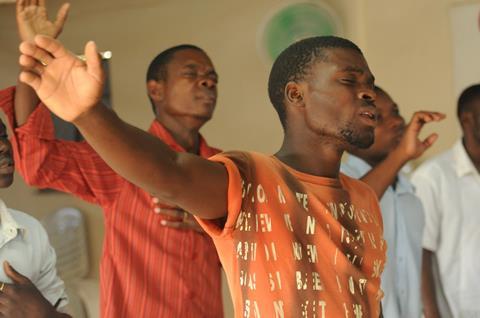Under current Ugandan Covid-19 restrictions, you can go to the shops or eat in a restaurant but not attend Church. Now, in a country where 89 per cent of people are Christians, that ban is being challenged in the courts

Watching from Europe, you might not assume that religious freedom would be a problem within the East African community. The image of large congregations dancing, clapping and shouting praises to God is often the first place that the Western mind goes to when thinking of Kenya or Tanzania. There are more Christians in Africa than on any other continent, and that’s not going to change any time soon.
Yet Agnes Namaganda has been banned from attending church for the last six weeks. And she’ll be forbidden from public worship for at least the next two months. So will everyone else in her faith community and others across Uganda. The government updated their Covid-19 regulations on Friday to allow restaurants, shopping malls and arcades to open - but not churches.
Religious freedom is deeply rooted in legal foundations and must be upheld
With 89 per cent of the population professing the Christian faith, Uganda is set to become one of the top ten most Christian countries by 2060. In light of this, the prohibition against churches opening could not be more serious. But when looking at the wider trend of Covid restrictions across the world, the news shouldn’t come as too much of a surprise.
Collateral damage
It hasn’t even been 18 months since the word ‘Covid’ first passed most of our lips, upturning the world as we knew it. Religious freedom was a collateral casualty worldwide. In the primary wave of pandemic panic, blanket bans on places of worship were rolled out on almost every continent. The decision was legally wrong. Freedom of religion and belief, and the practice thereof, is a fundamental human right. According to international law, it can be prohibited only so far as is strictly necessary, proportionate and non-discriminatory.
Blanket bans that withhold worship across entire countries with no consideration of circumstance can never claim to uphold this nuance. Three persons living on an isolated country mountain with no exposure to Covid-19 surely don’t need to undergo the same protective restrictions as those in a densely populated urban environment. As the pandemic wore on with no data to prove that religious buildings were more contagious than the dry-cleaners and off-licenses that were left open, reasoning for the closure became more and more flimsy.
And so the pattern of government overreach, legal challenge and ban-overturn has repeated across much of the world. A brave Glasgow priest was one of the first to stand up for religious freedom in March 2021. Alongside twenty-seven other faith leaders, Rev Canon Tom White led the case for reopening his church, an essential source of hope for his struggling community, which is one of the most deprived in the UK. Thanks to his efforts, supported by ADF UK, the ban on worship was momentously overturned - in a country where only 7.2 per cent of the population actually attend church.
Domino effect
Just one day after Rev White’s win for the people of Scotland, the domino effect saw a similar ban struck down by the Supreme Court in Chile. A court in the human rights hub of Geneva, Switzerland was the next to follow suit. The court upheld religious freedom after a mixed group of faith leaders and a medical doctor brought forward a challenge. Litigation is ongoing in several other countries. Where bans emerge, they are overturned. It raises the question as to why governments are not learning from this repetitive global story.
And yet, Agnes and her community in Uganda still stand deprived of access to their places of worship. They are denied their right to live out their faith in public and in community.
The right to worship is a deeply personal one
After a fall in the number of Covid-19 cases since the national spike on 20th June, Uganda has relaxed their lockdown measures considerably. Those who want to shop may visit the mall, and those who want to eat out may attend a restaurant; yet there is no place of worship open for those who want to practice their religion.
Why are people of faith being treated as more contagious than others?
Standing together
Agnes’s Church, standing together with a local Imam who is seeking freedom of worship for the Muslim community, are now following in Canon Tom’s footsteps. Their brief was filed in court this week.
As in Scotland, so in Uganda. The core, universal principle of human rights, which was upheld for Scots, should be upheld for Ugandans too. When challenged, Scottish government officials could find no data to justify the stricter clampdown on churches compared to other public buildings such as supermarkets, bicycle shops or dry cleaners. Westminster’s chief advisors, Chris Whitty and Patrick Vallance, admitted that any evidence of churches being more susceptible to covid-spread was “anecdotal” rather than based on scientific fact. When put to the test, no government so far has been able to produce any firm reasoning as to why religious groups should be treated any differently. The ball is now in the court of the Ugandan government to try and prove what others have failed to.
MP Theresa May spoke out early on against the disproportionate restrictions on churches in the UK, saying: “My concern is that the government today, making it illegal to conduct an act of public worship for the best of intentions, sets a precedent that could be misused for a government in the future with the worst of intentions.”
The significance of religious freedom in the midst of a global crisis goes beyond spiritual welfare. It’s a test of which human rights the government truly values - and which it doesn’t. Africa should avoid the missteps of the West and revoke these clearly unlawful bans. And the international community must provide clarity on this standard. The right to worship is a deeply personal one. When that right is lost and discarded, it puts the very premise of all human-rights protections at risk. Religious freedom isn’t a cathedral built on sand – it’s deeply rooted in legal foundations and must be upheld for everyone.




































